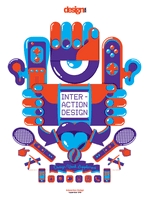Natural selection
Digital technology appears to be driving human evolution, now that we’re starting to outsource our long-term memory needs and abandoning our sense of self to the Internet. Should we be worried? asks Adrian Shaughnessy
Surely I can’t be the only one who sometimes gets confused between the digital realm and the physical world? The other day I was looking for a book among the clutter of my studio. I usually know where to find stuff, but on this occasion I was stumped, and for a split second I thought
about tapping the title of the missing book into Google. As quickly as the thought occurred to me, I dismissed it as loopy.
Yet the fact that I even considered it shows the extent to which life has become unthinkable without the countless online and interactive aids that surround us. For most of us, the digital realm is as natural as the grass that grows in the fields and the concrete that makes the tower blocks and flyovers.
And yet, this naturalness, this acceptance of and reliance on digital ways of doing things is transforming how we live and work. I can list dozens of mundane aspects of my life that have changed irreversibly. I haven’t bought a CD for months (but I listen to more music and a greater variety of music than ever before – all of it legal); I watch more television on my laptop than on my TV; I still buy The Guardian every day, but probably spend more time on the paper’s website than I do with the woodpulp version; I can’t imagine how I ever got anywhere in the days before satnav; I have written and posted only one letter this year; I haven’t used a telephone kiosk since I got my first mobile phone sometime in the 1990s.
Most people would agree that life has been improved by the digital revolution. Yet I wonder if we can be so sure about the psychological impact of this technological eruption? Take the question of memory. It may just be advancing years, but I swear my memory is getting poorer. Could this be because I’ve come to rely on the great throbbing, always-on brain called the Internet? And does it mean that there will come a time when we will lose long-term memory because there will be no need to remember much, since everything will be stored in the limitless vaults of cyberspace? If you think that’s far-fetched, just remember that our toes were once used for gripping branches. When we learned to walk upright, they changed and ceased to be prehensile. Perhaps our brains are going through a similar transformation?
But it is in the realm of interpersonal relationships that we see the most visible changes. The Archbishop of Westminster Vincent Nichols, head of the Roman Catholic Church in England and Wales, recently warned against social networking sites. He noted that they built ‘transient relationships’ that can leave users traumatised and even suicidal when these relationships collapse. His comments came after the inquest into the death of 15-yearold Megan Gillan, a student who took a fatal overdose of painkillers after being bullied on a social networking site. Nichols went on to say that the Internet and mobile phones were ‘dehumanising’ community life and that relationships had been weakened by the decline in face-to-face meetings.
He is right to raise concern. But bullying, dehumanisation and failed relationships have existed in the workplace, the campus and the playground for centuries, and seem neither better or worse because of online social networking. All the social networkers I know seem to cope pretty well with the distinction between digital and flesh-and-blood friends.
My concern is slightly different. I’m saddened by the end of privacy. By privacy I don’t mean anti-community feeling, or misanthropic tendencies. Instead, I’m referring to that perfectly reasonable need to keep aspects of our lives to ourselves. In other words, the need for an inner life. Yet social networking sites – and many other aspects of digital technology – encourage us to live our entire lives in a blaze of self-revelation. What does this do to our sense of self? If we have no sense of balance between our inner and outer selves, how do we stop ourselves becoming pub bores on a global scale?
One thing’s for sure: we’ll find out soon. We don’t have to wait long for anything in the new digital world.
Adrian Shaughnessy is an independent designer, writer and broadcaster. He is giving the keynote speech at the i-Design conference at the University of Westminster on 24 September
-
Post a comment




